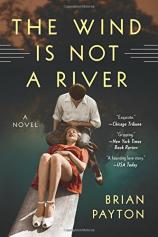Reading Group Guide
Discussion Questions
The Wind Is Not a River

1. THE WIND IS NOT A RIVER is a novel set against the backdrop of an actual WWII battle most people are unfamiliar with. Had you heard of the battle for the Aleutians before reading this book? What surprised you the most about the war in Alaska?
2. THE WIND IS NOT A RIVER, the Aleutian landscape plays a critical role in the novel, almost becoming a character unto itself. At the beginning of the story, John Easley is hurled into this little-known wilderness. How does the Aleutian landscape affect the lives and destinies of the novel’s main characters, John and Helen? How does it affect the U.S. and Japanese forces? How is it reflected in the style and themes of the book?
3. John Easley believes that North Americans have a right to know about the war on their own west coast. He goes to great lengths to get and bring home the story of the war in the Aleutians. He also says, “the sacrifices made on our behalf must be known before they can be remembered” (pg. 34). Was he justified in the actions he took to witness and report these events?
4. THE WIND IS NOT A RIVER is a story of survival as well as a story about the power of love. Helen Easley is driven to find her beloved husband and bring him home. Helen also loves her father, but is forced to leave him behind. John loves Helen, but feels duty-bound to return to the Aleutians. John loves his deceased brother Warren; he loves Karl and Tatiana. Which relationship affected you the most? Which surprised you the most?
5. The displacement and mistreatment of the Aleut people is explored in this novel. The evacuation of the Aleut people was done for expedience, as well as their own protection. Discuss this protective/paternalistic impulse. Was it justified? Would this kind of treatment have happened to nonnative Americans?
6. The photograph and possessions of a young Aleut woman, Tatiana, is discovered by John Easley in his most dire time of need. For him, these found objects take on almost mystical proportions. The urge to idealize others through their images, words or possessions seems almost innate. Can you think of other examples from our culture or personal experience? Discuss.
7. Helen finds strength in her religious beliefs and traditions. When things seem hopeless, her faith sees her through. John finds himself facing some of the darkest parts of human nature and the nature of existence itself. He comes away with a conviction that this life is all we have. Which character’s beliefs come closest to your own? Did you find insight into the mind (soul?) of the character of the opposing point of view? Discuss the role of “faith” in the story.
8. THE WIND IS NOT A RIVER explores the role of censorship and our understanding of history. Was censorship understandable in the context of this battle and war? What about more recent wars and conflicts?
9. The novel ends with Helen and Tatiana coming together in the same place at the end of the WWII. Helen feels protective of this young woman and her fiancé. She leaves without speaking to her. Was it the right decision? Are we sometimes justified in protecting others from knowledge we possess?
The Wind Is Not a River
- Publication Date: September 2, 2014
- Genres: Fiction, Historical Fiction
- Paperback: 352 pages
- Publisher: Ecco
- ISBN-10: 006227998X
- ISBN-13: 9780062279989








